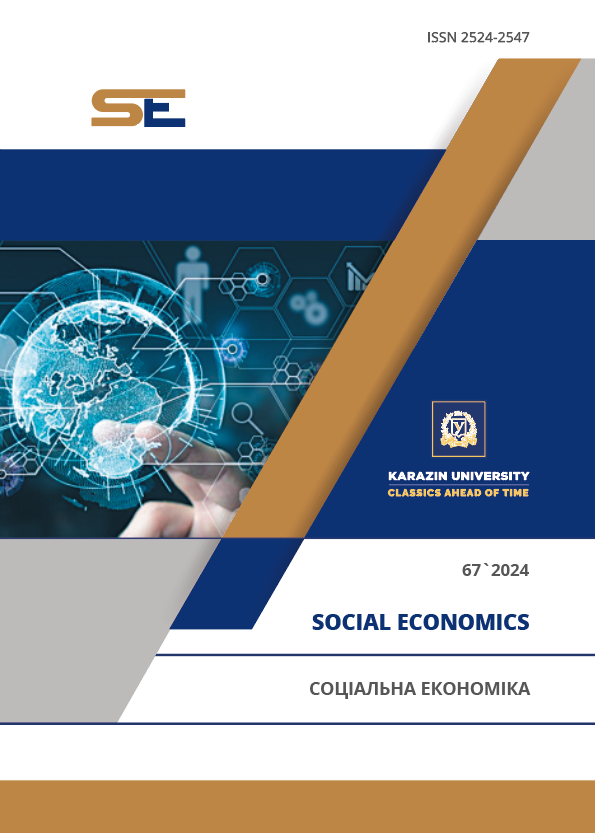COUNTRY-BY-COUNTRY REPORTING OF LEADING EU-UKRAINE FORESTRY COMPANIES: ENVIRONMENTAL CAPITAL DISCLOSURE COMPARATIVE STUDY
Abstract
This study aims to analyze the activities of forestry companies in both the European Union countries and Ukraine through an examination of their non-financial reports. By scrutinizing these reports, the study seeks to unveil aspects of social responsibility and assess the degree of implementation and achievement of Sustainable Development Goals. Special attention is given to the disclosure of ecological information by forestry enterprises, aimed at identifying potential risks and enhancing investor and consumer trust. The article underscores the significance of ecological responsibility within the strategies and operations of these companies. It highlights the sustainability report as a pivotal tool for modern forestry firms, fostering improved management practices, collaboration, and development based on sustainability principles. The push for non-financial information disclosure, driven by EU Directives, incentivizes enterprises to refine their strategies, incorporating ecological and social considerations and fostering responsible conduct towards stakeholders. The authors conduct an in-depth analysis of transparency levels, ecological responsibility, and the extent to which ecological aspects are integrated into the operations of forestry enterprises. Companies that effectively implement and expand non-financial reporting in the forestry and wood processing sectors are better positioned to attract investments from funds and consumers prioritizing sustainability and ethics. Consequently, this fosters a positive public perception and enhances competitiveness. The relevance of this research lies in its contribution to environmental preservation and the establishment of a sustainable economy. The findings are expected to provide valuable insights into environmental management practices and guide efforts towards enhancing ecological sustainability in forestry.
Downloads
References
De Groot, R., Brander, L., Van Der Ploeg, S., Costanza, R., Bernard, F., Braat, L., ... & Van Beukering, P. (2012). Global estimates of the value of ecosystems and their services in monetary units. Ecosystem services, 1(1), 50-61. doi: https://doi.org/10.1016/j.ecoser.2012.07.005
Costanza, R. (2000). Social goals and the valuation of ecosystem services. Ecosystems, 4-10. doi: https://doi.org/10.1007/s100210000002
Daly, H. E. (2007). Ecological economics and sustainable development. Edward Elgar Publishing.
Farley, J., Pascual, U., Muradian, R., Brander, L., Gómez-Baggethun, E., Martín-López, B., Verma, M., ... & Turner, R. K. (2012). The economics of valuing ecosystem services and biodiversity. In The economics of ecosystems and biodiversity: Ecological and economic foundations (pp. 183-256). doi: https://doi.org/10.4324/9781849775489
Summers, D. M., Bryan, B. A., Crossman, N. D., & Meyer, W. S. (2012). Species vulnerability to climate change: impacts on spatial conservation priorities and species representation. Global Change Biology, 18(7), 2335-2348. doi: https://doi.org/10.1111/j.1365-2486.2012.02700.x
Watt, A. D., Fliickiger, W., Leith, I. D., & Lindsay, E. Atmospheric pollution, elevated C02and spruce aphids. The Green Spruce Aphid in Western Europe, 86. doi: https://doi.org/10.1016/S0378-1127(02)00658-8
Shvets, Yu. O., & Grigoryovych, L. S. (2017). Ecological tax as a tool of nature economy. Economy and society, 10, 488-493. (In Ukrainian)
Drebot, O. I., Palyanychko, N. I., & Dankevich, S. M. (2020). Taxation of forestry enterprises of Ukraine in the context of balanced land use. Efficiency of public administration, 63. doi: https://doi.org/10.33990/2070-4011.63.2020.212677 (In Ukrainian)
Kolisnyk, Z. B. (2014). The influence of economic, organizational and environmental factors on the results of the operation of the largest forestry companies. Economy and the state, 6, 108-113. (In Ukrainian)
Ozeran, V. O., & Chik, M. Yu. (2011). Implementation of the concept of sustainable development in forestry enterprises, Problemy teorii ta metodolohii bukhhalters’koho obliku, kontroliu i analizu: mizhnarodnyj zbirnyk naukovykh, 3 (21), 266-273. (In Ukrainian)
Mion, G., & Loza Adaui, C. R. (2019). Mandatory Nonfinancial Disclosure and Its Consequences on the Sustainability Reporting Quality of Italian and German Companies. Sustainability. doi: https://doi.org/10.3390/su11174612
Cho, C. H., & Patten, D. M. (2007). The role of environmental disclosures as tools of legitimacy: A research note. Account. Organ. Soc, 32, 639–647. doi: https://doi.org/10.1016/j.aos.2006.09.009
Hess, D., & Dunfee, T. W. (2007). The Kasky-Nike Threat to Corporate Social Reporting: Implementing a Standard of Optimal Truthful Disclosure as a Solution. Bus. Ethics Q, 17, 5–32. doi: https://doi.org/10.5840/beq200717119
Deegan, C. (2002). Introduction The legitimising effect of social and environmental disclosures – A theoretical foundation. Audit. Account. J, 15, 282–311. doi: https://doi.org/10.1108/09513570210435852
Al-Tuwaijri, S. A., Christensen, T. E., & Hughes, K. E. (2004). The relations among environmental disclosure, environmental performance, and economic performance: A simultaneous equations approach. Account. Organ. Soc, 29, 447–471. doi: https://doi.org/10.1016/S0361-3682(03)00032-1
Ranängen, H., & Zobel, Th. (2014). Revisiting the ‘how’ of corporate social responsibility in extractive industries and forestry. Journal of Cleaner Production, 84, 299–312. doi: https://doi.org/10.1016/j.jclepro.2014.02.020
Ronzon, T. & M’Barek, R. (2018). Socioeconomic indicators to monitor the EU’s bioeconomy in transition. Sustainability, 10(6), 1745. doi: https://doi.org/10.2760/835046
Robert, N., Jonsson, R., Chudy, R., & Camia, A. (2020). The EU Bioeconomy: Supporting an Employment Shift Downstream in the Wood-Based Value Chains? Sustainability, 12(3), 758. doi: https://doi.org/10.3390/su12030758
Felicia no, D., Bouriaud, L., Brahic, E., Deuffic, P., Dobsinska, Z., Jarsky, V., Lawrence, A., Nybakk, E., Quiroga, S., Suarez, C., & Ficko, A. (2017). Understanding private forest owners’ conceptualisation of forest management: Evidence from a survey in seven European countries. Journal of Rural Studies, 54, 162-176. doi: https://doi.org/10.1016/j.jrurstud.2017.06.016
Saprykina, M. (2019). What is the purpose of business reports on sustainable development. Economic truth. Retrieved from https://www.epravda.com.ua/columns/2019/10/31/653160/ (In Ukrainian)




